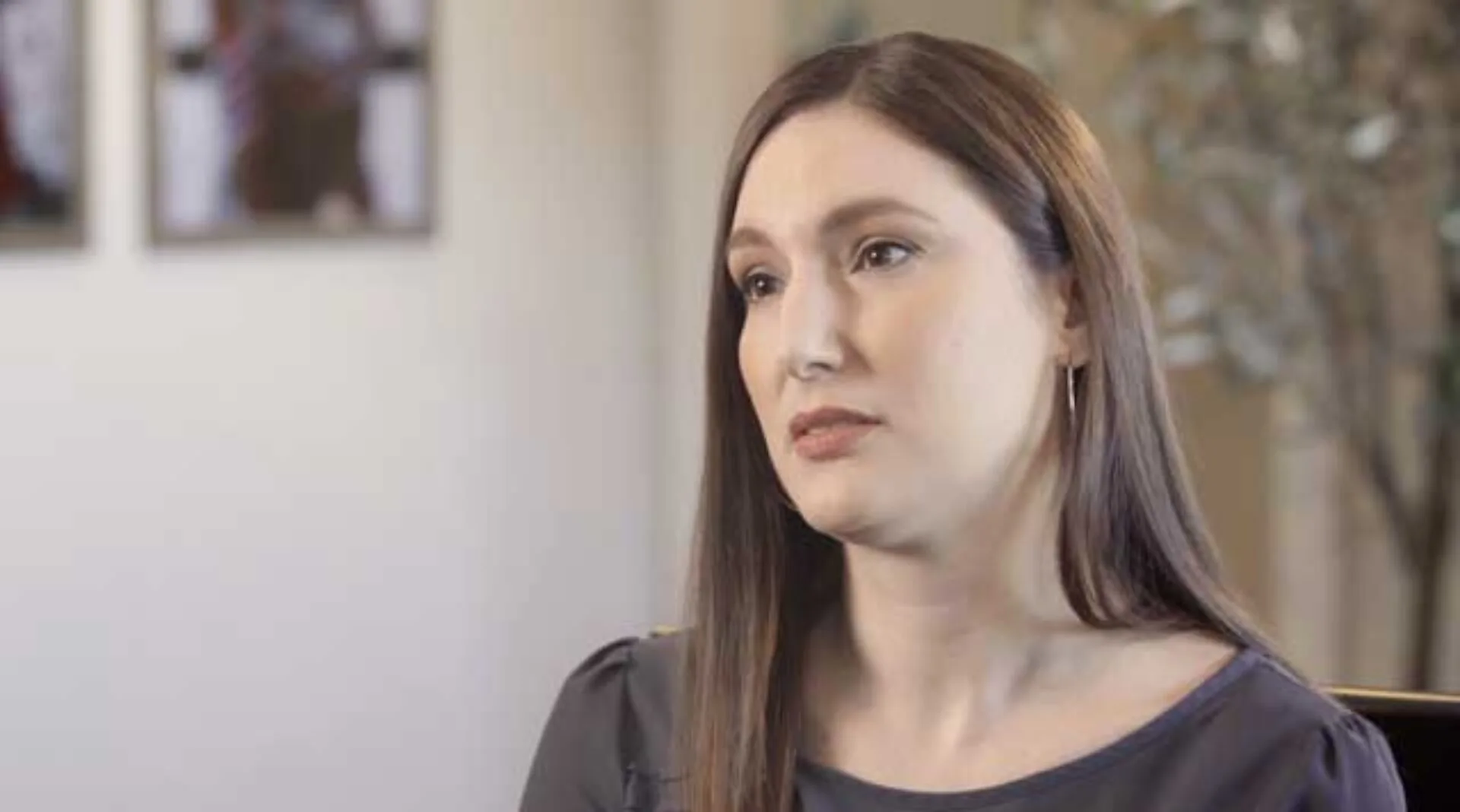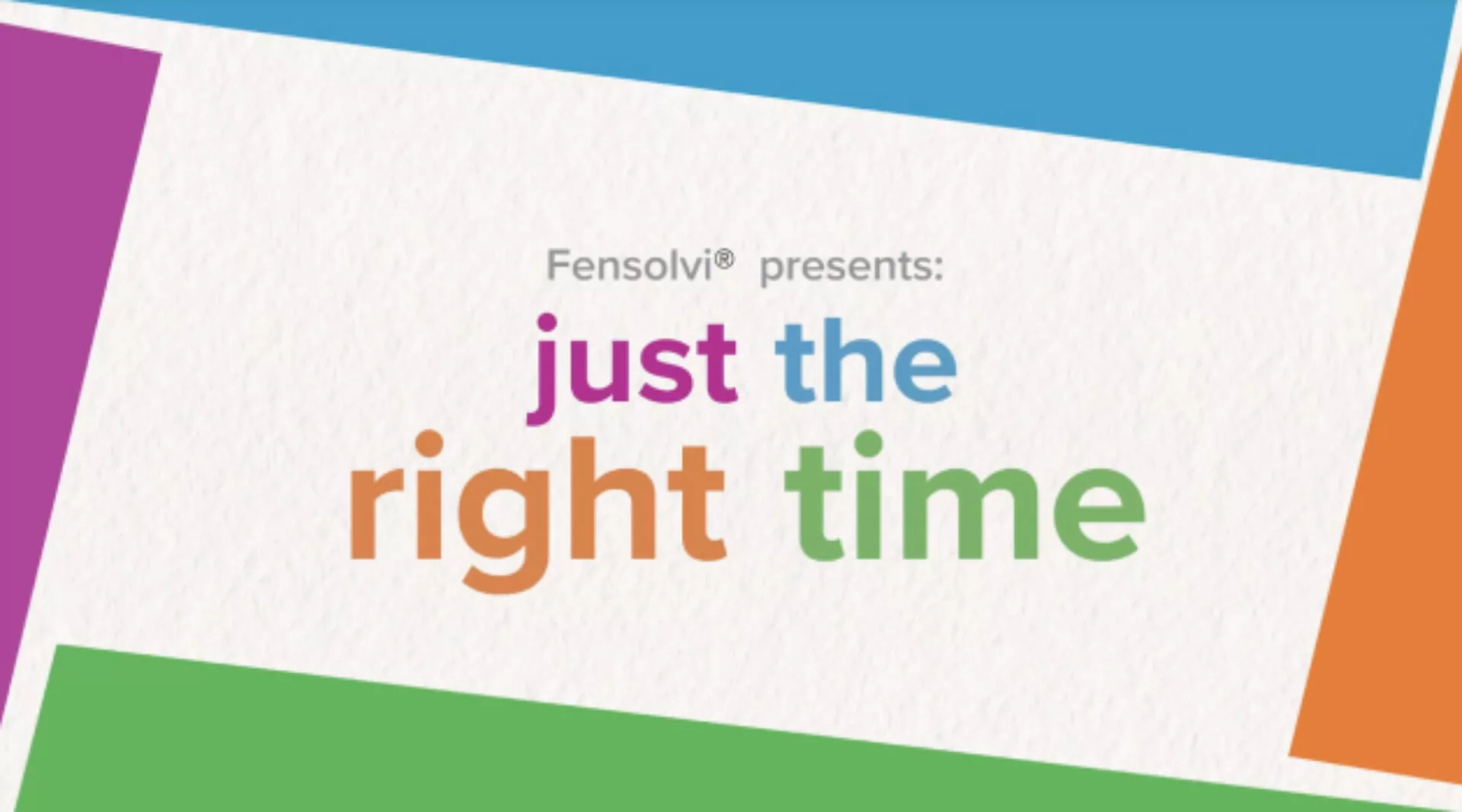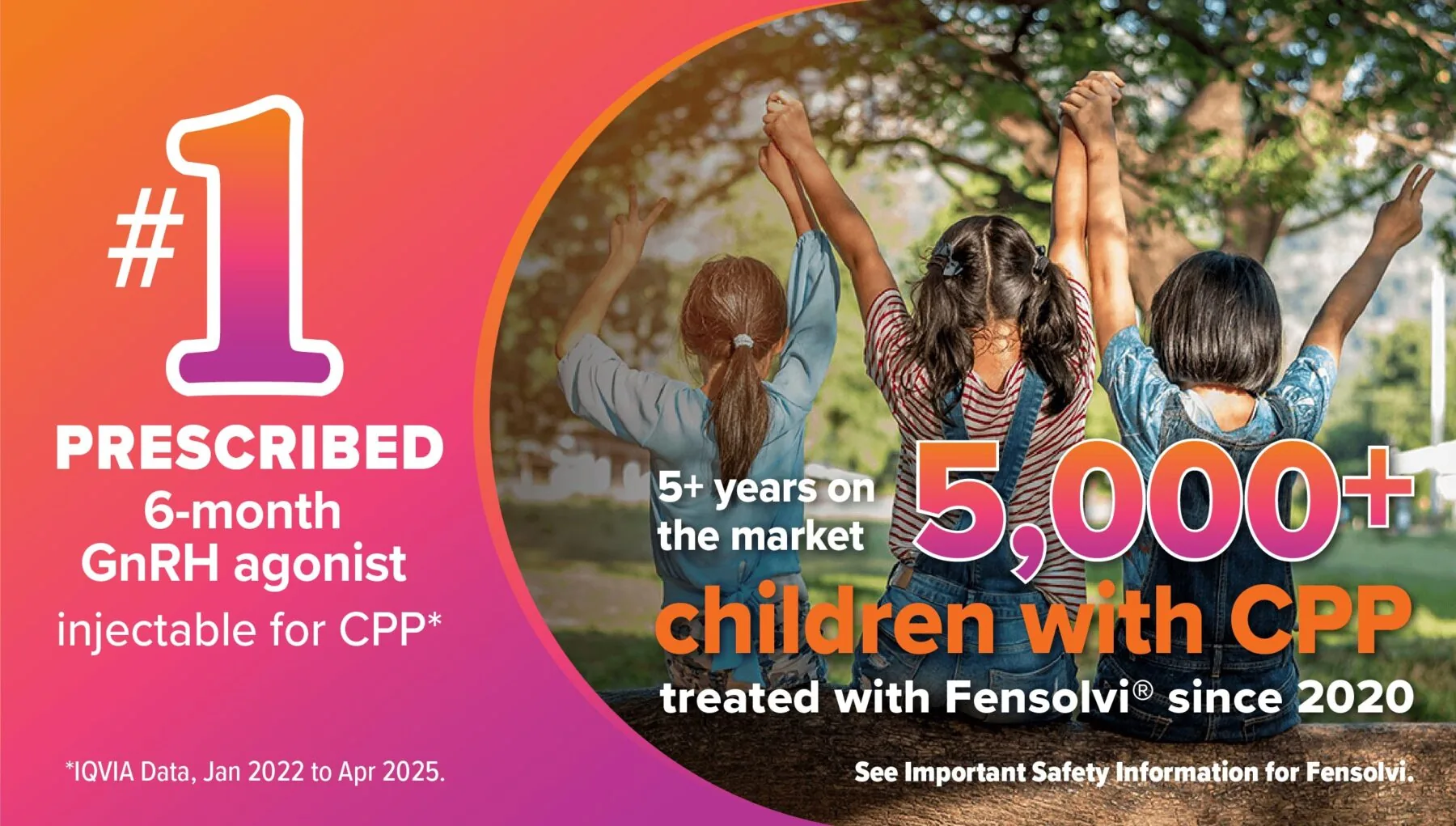
Keep Childhood Focused On
More Adventure Time
Created with your child in mind, Fensolvi is the first and only 6-month subcutaneous (under-the-skin) injection for Central Precocious Puberty—so your kid can get back to being a kid.

Understanding Central Precocious Puberty (CPP): A Mother’s Concern
Meet Angie, a mother and pharmacist, at a children’s hospital whose daughter was diagnosed with Central Precocious Puberty. In this video, she shared her daughter’s early signs of CPP, the challenges of diagnosis, and their journey to find the right treatment.

Keep Childhood Simple
Sophie’s Story
Sophie’s mom started to notice changes in her young daughter-body odor, growth spurts, and even acne. A trip to the doctor’s office revealed Sophie may be experiencing signs of central precocious puberty (CPP)(7).
Sophie enjoys an active lifestyle, so she needed a treatment that required fewer injections, fewer visits to the doctor, and limited impact on her daily activities.
Her doctor recommended Fensolvi, which made it easy for mom to have peace of mind and Sophie to focus on being a kid.
A Simple Treatment for CPP
Fensolvi is an innovative delivery system of a proven medicine called a “GnRH agonist.” It’s given as a small shot with medicine that stays just under the skin for 6 months (1).
Just two treatments per year
Injected just below the skin

What is Fensolvi?
Watch this informational video with your child to help them understand what’s going on in their body, and how CPP treatment will let them grow up at just the right time. Watch this informational video with your child to help them understand what’s going on in their body, and how CPP treatment will allow them to grow up at just the right time.
FAQ
Fensolvi is a medicine called a “GnRH agonist.” It’s given as a small shot with medicine in it that stays just under the skin for 6 months, providing a steady source of drug to the body. This can help stop the GnRH signals that cause early puberty.
Fensolvi is the first and only subcutaneous injection for central precocious puberty (CPP) treatment, and does not require an intramuscular injection or surgery.
Fensolvi is given as a shot just under the skin. This means:
- It’s easy to find a place to give the shot, as it can go in most areas that have some fat under the skin
- A short 5/8-inch needle is used
- No need for injections into the muscle
- No surgery needed
- Local anesthesia can be used to numb the area
Fensolvi is given every 6 months which means:
- Only 2 shots a year
- Shots can be given during your twice-yearly visits to your pediatric endocrinologist’s office
Class: Fensolvi (leuprolide acetate) for injectable suspension, is the only subcutaneously delivered leuprolide acetate in the class of Gonadotropin Releasing Hormone (GnRH) agonists.
Indication: Fensolvi is indicated for the treatment of pediatric patients 2 years of age and older with central precocious puberty.
Puberty usually starts between ages 8 and 13 for girls and 9 and 14 for boys, when the brain (pituitary gland) begins receiving signals from GnRH (gonadotropin-releasing hormone). If puberty starts earlier, it’s called “precocious puberty,” which means it happens earlier than the normal age range. The most common type is called central precocious puberty, or CPP. CPP is rare. It affects about 1 in 5,000 to 10,000 children.
In children with CPP, the brain begins to release waves of the puberty-inducing hormone (gonadotropin-releasing hormone) as early as age 2. Doctors diagnose CPP when signs of puberty are seen in girls younger than 8 or boys younger than 9. CPP can be treated by administering medicine that prevents the brain from releasing GnRH. When it’s time for puberty to start, your child’s doctor can simply stop treatment.
CPP is treatable and is not a lifelong condition. Fensolvi® (leuprolide acetate) for injectable suspension can help.
“Puberty” is a word for the physical changes that happen over a few years as boys and girls develop sexually into teens and then adults. Changes generally include hair growth in various places on the body; the development of breasts in girls and the testicles in boys; and a growth spurt, which results in significant increases in height
Children with precocious puberty have higher levels of sex steroid hormones produced at a younger age. These same hormones that cause breast or testicular development and pubic hair growth, also cause rapid growth of bones and muscles, and changes in body shape and size.(8, 9, 3)
These rapid changes are caused because the bones of children with CPP mature more quickly than normal. When this happens, children experience early fusion of the growth plates, which causes the bones to stop growing at an earlier age.(3, 9, 10) If CPP is left untreated, most boys will not grow taller than 5 feet 2 inches, and girls often do not grow taller than 5 feet.(7)
Hormones are chemical substances that regulate body functions. Puberty starts when the brain begins releasing “pulses” or “waves” of a hormone called gonadotropin-releasing hormone (GnRH). GnRH causes other hormones to be released, which in turn cause the physical changes that come with puberty.(3)
In children with CPP, the GnRH waves start at a younger age. The timing of puberty can be impacted by genetics, nutrition, and/or socioeconomic status. It’s not always clear what causes CPP in a particular child.(2, 11)
Several different genetic causes have been identified for children with family history of CPP. When an altered gene is passed from parent to child, the condition is known as familial central precocious puberty. In addition to genetics, the timing of puberty can be influenced by other factors including nutrition or socioeconomic status.
Correct diagnosis of CPP at an early age is important. Doctors generally diagnose CPP when a girl younger than 8 or a boy younger than 9 is showing signs of puberty. Since early signs of puberty can also be caused by things other than CPP, your child’s doctor needs to rule out other conditions that would require different treatment. There are several things your child’s doctor may do to accurately diagnose CPP(3, 11) and rule out other issues, including(4):
- Take a medical history for the child (and the family)
- Perform a physical exam
- Collect blood for laboratory tests
- Request imaging studies
You have already taken the first step by getting an accurate diagnosis for your child. Talk to your child about their body changes in an open, non-judgmental way. Use language they will understand and use correct body part terminology. Ask your child how they are feeling. Listen to what your child has to say. And keep the conversation going; this should not be a one-time conversation. Ask your doctor’s office if they have books or videos or other tools to help explain CPP at an age-appropriate level.(4)
The good news about CPP is that it’s treatable, and it is not a lifelong condition. It ends when normal puberty starts at an appropriate age. It’s important to treat, though, because not treating CPP can lead to a shorter adult height, and may also cause emotional problems as the child develops.
Treatments for CPP target the cause of early puberty, which is the waves of GnRH occurring earlier than they should. Treatment allows for stable GnRH levels, which stops progression of puberty until the age when it should happen.
Fensolvi® (leuprolide acetate) injectable suspension is one of several treatments available for CPP.
Because bone growth is part of puberty, children with CPP may initially be taller than their friends and classmates.(3,8) For some children, this can be perceived as a good thing, however it’s important to know that without treatment for CPP, children may stop growing at a younger age and may end up much shorter as adults, averaging 5 ft tall. (7)
The goals of treatment are to stop physical maturation, prevent early menstruation, and bring final adult height closer to genetic expectation, allowing for normal psychosocial development. Children with CPP who are treated can experience normal development into adulthood. (3)
For some children, choosing not to treat may be the appropriate option. When making this decision, it’s important to discuss your options with your doctor. If after consideration your doctor recommends treatment, there are a few reasons why this would be important. Choosing not to treat CPP may cause psychological and behavioral issues, as developing physically or sexually ahead of friends and classmates can be emotionally difficult.(8) Physically, when left untreated, the child may not reach their expected adult height. If CPP is left untreated, most boys will not grow taller than 5 feet 2 inches, and girls often do not grow taller than 5 feet.(7)
Children with CPP who are treated can experience normal development into adulthood. Girls should have normal periods, and be able to become pregnant as adults.(3,5)
It’s important to know that your child’s puberty symptoms may get worse for a short time at the start of treatment. This is because it can take up to 3 weeks for the treatment to stop the waves of GnRH that are causing puberty. After that, symptoms should start to get better—and your child can go back to simply being a child!
If you have questions about CPP or Fensolvi, be sure to ask your child’s doctor or nurse. Please also read the safety information.
In clinical trials, Fensolvi was well tolerated. No adverse reactions led to withdrawal from the study or discontinuation of study drug.
The most common side effects seen in studies with Fensolvi were injection site pain/redness, colds/sore throat, fever, headache, cough, stomach pain, nausea, constipation, vomiting, wheezing, wet cough and hot flush. Tell your child’s doctor about any side effects. These are not all the possible side effects of Fensolvi. Call your doctor for medical advice about side effects.
To report Suspected Adverse Reactions, contact Tolmar, Inc. at 1-844-4TOLMAR or FDA at 1-800-FDA-1088 or www.fda.gov/medwatch
Fensolvi’s comprehensive support program equips children and their caregivers with the essential resources for navigating the complexities of CPP treatment. For example, the Fensolvi Starter Kit contains informative materials for caregivers and interactive activities for children to make the treatment process a little easier. Tolmar is happy to deliver supplementary educational materials and field questions to keep you informed about CPP treatment.
We know the financial aspect of CPP treatment can be challenging—and we have a comprehensive, best-in-class patient support program to help your child get the treatment that he or she needs. With Fensolvi TotalSolutions, you can pay as little as $5 for your Fensolvi prescription. Your doctor or nurse can quickly and easily assist you in enrolling in the program.

Fensolvi Starter Kits for Patients
We’re excited to offer Fensolvi starter kits for new patients who have been prescribed Fensolvi. Each kit contains helpful information for caregivers, along with engaging activities for children to make each treatment visit a little more fun. Contents include a treatment brochure, coloring and iSpy sheets, coloring pencils, a book of jokes, and coping cards—all inside a handy drawstring bag.
Ask your child’s doctor for a starter kit at your next visit!
Eligible patients can pay as little as $5 for each 6 month dose with the Fensolvi TotalSolutions Copay program. Enrollment is simple, ask your HCP to enroll you in the program or call 1-866-FENSOLVI (336-7658) for more information. Fensolvi TotalSolutions is also here to help with questions on Fensolvi insurance coverage.for more information. Fensolvi TotalSolutions is also here to help with questions on Fensolvi insurance coverage.See terms and conditions below
Learn More About CPP
and Fensolvi
Explore our resources to learn more about Central Precocious Puberty and how to keep childhood simple for children with CPP.
Get in Touch with Us
Stay updated on your child’s treatment
By providing your information, you are giving Tolmar, Inc. and other parties working with us permission to communicate with you about Fensolvi® or other products, services, and offers from Tolmar, Inc. If you don’t find the information useful, you can opt out at any time. We value your privacy and we encourage you to review our privacy policy for more information.
HAVE QUESTIONS ABOUT CPP TREATMENT?
Contact us at 1-866-FENSOLVI (336-7658)
"*" indicates required fields
Share your CPP story with others
To help other families going through the CPP journey, we’d love to share your experiences. If you are willing, please click below to provide your information.
IMPORTANT SAFETY INFORMATION
FENSOLVI is a type of medicine known as a gonadotropin releasing hormone (“GnRH”) agonist. It is used to treat central precocious puberty (CPP) in children 2 years of age and older and is administered as an injection under the skin (subcutaneously) by your child’s healthcare provider.
FENSOLVI should not be given to children:
- Who are sensitive to GnRH, GnRH agonists or any of the ingredients in FENSOLVI (your child’s doctor can help you know this)
- Call your child’s doctor or get emergency medical help right away if your child gets any symptoms of a serious allergic reaction
- Who are pregnant. FENSOLVI can cause birth defects or loss of the baby
During the first few weeks of treatment, an increase in signs and symptoms of puberty, including vaginal bleeding in girls, may occur.
Some children may have emotional changes with FENSOLVI, including crying, irritability, impatience, anger, or aggression. Call your child’s doctor right away if your child has any new or worsening emotional symptoms while taking FENSOLVI.
There have been reports of convulsions (uncontrolled movements due to rapid contraction and relaxation of muscles) in children taking GnRH agonists. Convulsions may occur in children who have not had them before. If your child has a convulsion, call your child’s doctor, or get emergency help right away.
Idiopathic Intracranial Hypertension (unexplained elevated pressure in the brain) has been reported in pediatric patients receiving GnRH agonists. Call your child’s doctor right away if your child has headaches and/or vision issues.
The most common side effects seen in studies with FENSOLVI were injection site pain/redness, colds/sore throat, fever, headache, cough, stomach pain, nausea, constipation, vomiting, wheezing, wet cough and hot flush. Tell your child’s doctor about any side effects.
These are not all the possible side effects of FENSOLVI. Call your doctor for medical advice about side effects. You may report side effects to FDA at 1-800-FDA-1088.
Please see Full Prescribing Information for additional Important Safety Information.
IMPORTANT SAFETY INFORMATION
FENSOLVI is a type of medicine known as a gonadotropin releasing hormone (“GnRH”) agonist. It is used to treat central precocious puberty (CPP) in children 2 years of age and older and is administered as an injection under the skin (subcutaneously) by your child’s healthcare provider.
FENSOLVI should not be given to children:
- Who are sensitive to GnRH, GnRH agonists or any of the ingredients in FENSOLVI (your child’s doctor can help you know this)
- Call your child’s doctor or get emergency medical help right away if your child gets any symptoms of a serious allergic reaction
- Who are pregnant. FENSOLVI can cause birth defects or loss of the baby
During the first few weeks of treatment, an increase in signs and symptoms of puberty, including vaginal bleeding in girls, may occur.
Some children may have emotional changes with FENSOLVI, including crying, irritability, impatience, anger, or aggression. Call your child’s doctor right away if your child has any new or worsening emotional symptoms while taking FENSOLVI.
There have been reports of convulsions (uncontrolled movements due to rapid contraction and relaxation of muscles) in children taking GnRH agonists. Convulsions may occur in children who have not had them before. If your child has a convulsion, call your child’s doctor, or get emergency help right away.
Idiopathic Intracranial Hypertension (unexplained elevated pressure in the brain) has been reported in pediatric patients receiving GnRH agonists. Call your child’s doctor right away if your child has headaches and/or vision issues.
The most common side effects seen in studies with FENSOLVI were injection site pain/redness, colds/sore throat, fever, headache, cough, stomach pain, nausea, constipation, vomiting, wheezing, wet cough and hot flush. Tell your child’s doctor about any side effects.
These are not all the possible side effects of FENSOLVI. Call your doctor for medical advice about side effects. You may report side effects to FDA at 1-800-FDA-1088.
Please see Full Prescribing Information for additional Important Safety Information.
References
- Fensolvi® (leuprolide acetate) for injectable suspension 45 mg Prescribing Information. Dublin 2, Ireland: Tolmar International, Ltd.; 11/2022.
- Genetics Home Reference (HR) 2020. Central Precocious Puberty. https://ghr.nlm.nih.gov/condition/central-precocious-puberty Accessed Feb 8, 2023
- Precocious puberty. National Organization for Rare Disorders (NORD). https://rarediseases.org/ rare-diseases/precocious-puberty/. 2016. Accessed January 6, 2023.
- Tirumuru SS, Arya P, Latthe P, Kirk J. Understanding precocious puberty in girls. The Obstetrician & Gynaecologist. 2012;14:212–129.
- Diag & TX Precocious puberty: Diagnosis and treatment. Mayo Clinic. https://www.mayoclinic.org/diseases -conditions/precocious-puberty/diagnosis-treatment/ drc-20351817. 2019. Accessed July 3, 2023.
- Adapted with permission from Crawford ED and Phillips JM. Cancer Management and Research. 2011; 3:201–209.
- Children’s National. Precocious Puberty. https://childrensnational.org/visit/conditions-and-treatments/diabetes-hormonal-disorders/precocious-puberty Accessed Feb 8, 2023
- Mayo Clinic. Precocious puberty. https://www.mayoclinic.org/diseases-conditions/precocious-puberty/symptoms-causes/syc-20351811 Accessed Apr 8, 2023
- Creo AL and Schwenk WF. Bone Age: A Handy Tool for Pediatric Providers. Pediatrics. 2017;140(6):e20171486
- Klein K, et al. Ped Endo Soc 2019. Accepted abstract.
- Partsch C-J, Sippell WG. Pathogenesis and epidemiology of precocious puberty. Effects of exogenous oestrogens. Human Reproduction Update. 2001:7(3); 292–302.
- Leung AK, Chiu AS, Siu OT, et al. Subcutaneous versus intramuscular administration of Haemophilus influenzae type b vaccine. J R Soc Health. 1989 Apr;109(2):71-3
- Russo L, Moore WV. A Comparison of Subcutaneous and Intramuscular Administration of Human Growth Hormone in the Therapy of Growth
- Prettyman J, Engel L, Boldt-Houle D, et al. Personalizing treatment in the delivery of care by nurses to patients with prostate cancer. Urologic Nursing. 2019;39(2):83-99
- Lupron Depot-Ped Prescribing Information. https://www.rxabbvie.com/pdf/lupronpediatric.pdf. Accessed November 30, 2023.
- Triptodur Promotional Prescribing Information. https://www.triptodur.com/assets/pdf/TRIP-PI-07_Triptodur%20Promotional%20PI.pdf. Accessed November 30, 2023.
FENSOLVI TOTALSOLUTIONS COPAY PROGRAM TERMS AND CONDITIONS
The Fensolvi® Co-pay Assistance Program (“Program”) is valid ONLY for patients who are prescribed Fensolvi® and are reimbursed exclusively by commercial insurance. This Program is valid only in the United States; but, void where prohibited by law or by the patient’s health insurance provider. This Program is non-transferable, limited to one per person, and cannot be combined with any other coupon, free trial, discount, prescription savings card, or other offer. Restrictions or limits may apply.
Medicare, Medicaid, Tricare and other federal health care program beneficiaries may not participate in this Program. This Program also is neither available for cash paying patients nor where your commercial plan reimburses you for the entire cost of your prescription drug. Patients cannot seek reimbursement from health insurance or any third party for any part of the assistance received through this Program. The patient or his/her guardian is responsible for reporting the receipt of all benefits or reimbursement received under the Program to any insurer, health plan, or other third party, as may be required. This Program is not insurance and is not intended as a substitute for insurance.
With the Program, you pay as little as $5 of your co-pay or co-insurance for Fensolvi®, per prescription. The remainder of your co-pay or co-insurance is covered, up to two prescriptions per calendar year. The Program assists with the cost of Fensolvi only. It does not assist with the cost of other administrations, medicines, procedures or office visit fees.
Tolmar, Inc. (“Tolmar”) reserves the right to terminate, rescind, revoke, or modify this Program at any time without notice. This Program expires at the end of the current calendar year, at which time you must re-enroll. For complete information about the terms and conditions of this Program, including the limitations on use and the amount of assistance call 1-866-FENSOLVI (336-7658).
Program managed by Scripts Rx on behalf of Tolmar.
